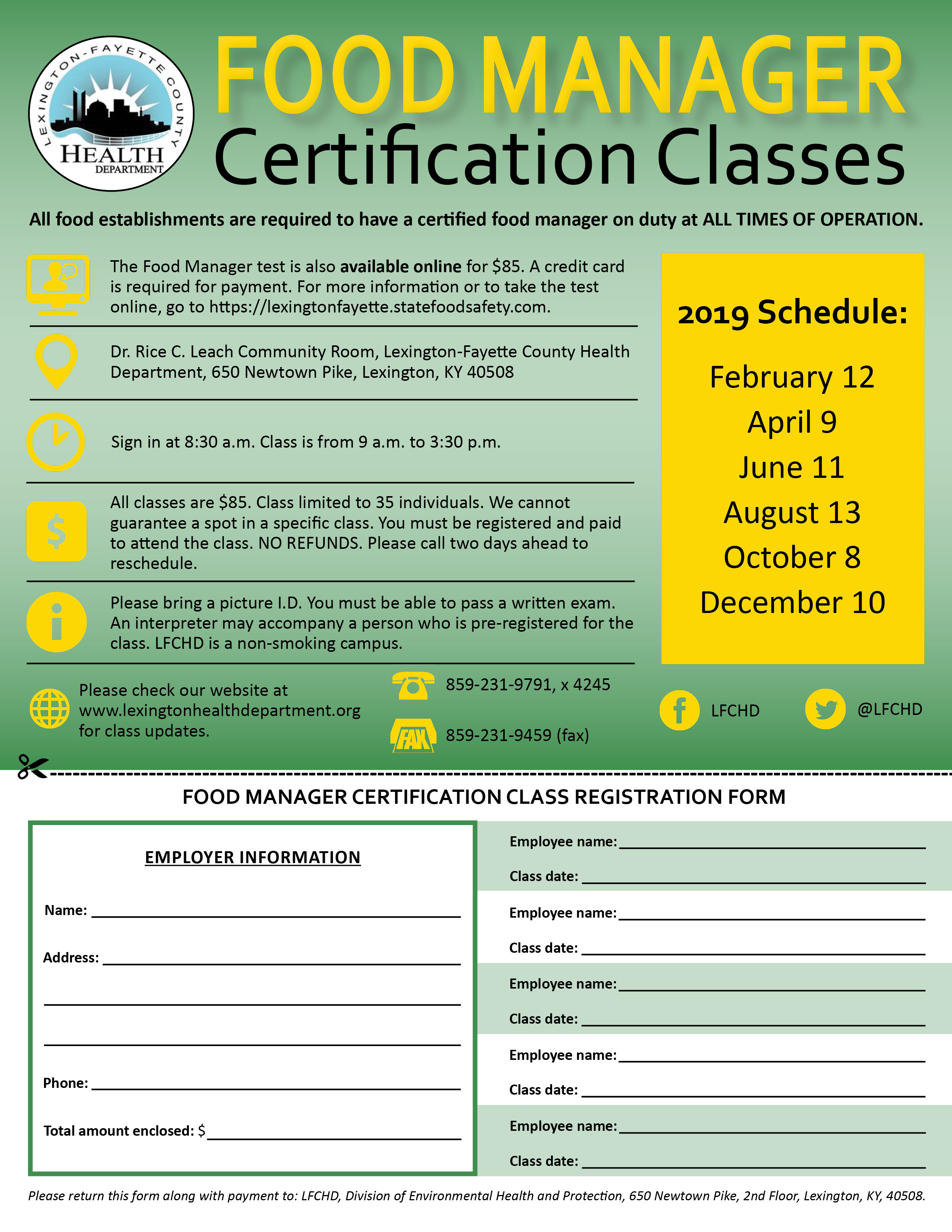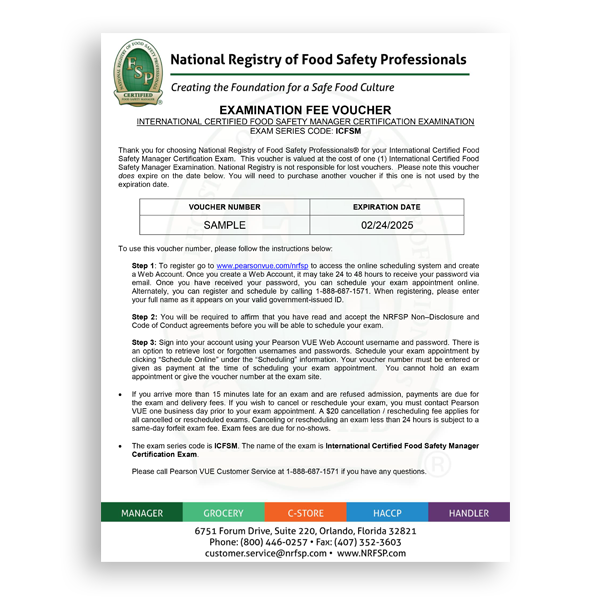Just How a ServSafe Manager Certification Elevates Management in Foodservice Operations
Just How a ServSafe Manager Certification Elevates Management in Foodservice Operations
Blog Article
Specialist Training for Food Manager Certification Made Simple
The relevance of food manager certification can not be underrated, especially in a period where food safety and security is critical. Professional training programs have actually progressed to enhance the qualification procedure, providing crucial understanding and functional abilities required for reliable food administration. These programs cover vital subjects, from foodborne illness avoidance to conformity with wellness guidelines. The true worth of this training prolongs past mere certification; it has extensive ramifications for profession development and public health and wellness. Understanding how these aspects adjoin may reveal possibilities that are often neglected.
Significance of Food Manager Accreditation
The value of Food Manager Certification can not be overstated in today's food service sector. This accreditation signifies that food supervisors have the important knowledge and abilities to make certain food safety and security, maintain health and wellness criteria, and copyright regulative conformity. In an era where foodborne health problems can have extreme effects, the role of a licensed food manager ends up being critical in securing public health.
Food Supervisor Certification not only furnishes people with the competence to recognize and mitigate food safety dangers yet also boosts the trustworthiness of the facility. Consumers are significantly critical; they look for assurance that their eating experience is secure and sanitary. Accreditation functions as a mark of professionalism and trust that can attract and maintain customers.
Furthermore, a licensed food manager can lead personnel training, promoting a culture of safety and security and responsibility within the work environment (Safe Serve Manager). Spending in Food Manager Qualification is a financial investment in quality, safety, and the total success of food solution procedures.
Review of Expert Training Programs
Expert training programs for food supervisor accreditation are created to supply extensive education and learning on food security techniques, regulative conformity, and risk administration. These programs aim to equip food service specialists with the expertise and abilities essential to make sure safe food handling and preparation in different setups, including dining establishments, providing solutions, and institutional food procedures.
Typically, expert training programs include both theoretical and sensible elements, permitting participants to engage with real-world scenarios. The educational program typically consists of necessary subjects such as foodborne health problems, correct food storage space methods, cleanliness procedures, and employee training approaches. These programs are regularly upgraded to align with the latest market criteria and policies, making sure that individuals get pertinent and existing information.
Lots of programs use flexible distribution techniques, including in-person classes, online training courses, or a hybrid approach, satisfying various understanding preferences and schedules. Upon effective completion, individuals normally obtain qualification, which is usually recognized by neighborhood health divisions and governing agencies, boosting their profession leads within the food solution sector. On the whole, expert training programs play an essential role in promoting a culture of food security and compliance among food supervisors and personnel.
Trick Subjects Covered in Training
Food safety and security is a critical focus in food supervisor accreditation training, including a selection of important subjects that guarantee individuals are well-equipped to deal with food securely. One of the primary subjects covered is the importance of personal health, which includes correct handwashing methods and the relevance of preserving tidiness in food prep work locations.
Additionally, the training addresses foodborne health problems, outlining the various microorganisms that can infect food and the symptoms connected with these ailments. Individuals discover regarding the problems that advertise bacterial development, which is crucial for preventing outbreaks.
Temperature level control is one more vital topic, stressing the secure food preparation, cooling, and storage temperatures needed to minimize threats. The training also covers cross-contamination avoidance techniques, making sure that raw and prepared foods are taken care of suitably to prevent dangerous communications.
In addition, food safety and security guidelines and guidelines, such as those set forth by the FDA and regional wellness departments, are talked about to give a thorough understanding of conformity requirements. Lastly, effective parasite control actions are analyzed to safeguard food establishments from problems that can compromise safety. Collectively, these subjects lay a strong foundation for risk-free food administration techniques.
Advantages of Expert Training
How can skilled training boost food safety and security practices within an establishment? Specialist training furnishes food managers with comprehensive knowledge of food security laws, industry standards, and ideal methods. This fundamental understanding is important for keeping a risk-free and clean food prep work environment, ultimately reducing the risk of foodborne diseases.
Furthermore, specialist training fosters a positive strategy to food safety by emphasizing preventative actions and hazard analysis. Supervisors educated by market experts can properly identify prospective dangers and execute approaches to alleviate them. This not only shields clients but likewise enhances the establishment's track record and credibility.
Additionally, expert training urges a society of continuous improvement. Food managers that take part in continuous education are better prepared to adjust to brand-new policies and fads in the food service market. This adaptability can result in improved functional effectiveness and price savings.

Actions to Attain Qualification
Attaining certification in food administration calls for a systematic strategy that incorporates numerous essential actions. Initially, people have to choose an approved training program that provides detailed coursework in food safety, management, and hygiene concepts. These programs frequently provide useful resources, including study materials and technique tests
Following, candidates should actively participate in the training sessions, whether in-person or on the internet, to improve their understanding of vital topics such as foodborne health problems, personal health, and proper food storage space strategies. Participation in discussions and sensible workouts can better strengthen understanding.

Once adequately ready, candidates can take the exam and set up. Successful completion typically calls for achieving a details passing score, which shows a detailed grasp of food safety and security standards.
Final Thought
In summary, expert training for food manager certification plays an important function in making certain food safety and security and compliance with governing criteria. The structured programs provide important expertise and functional abilities essential for handling foodborne illnesses and hygiene protocols effectively. By facilitating availability and improving career prospects, these training efforts contribute substantially to public wellness. Eventually, attaining food manager certification through professional training not just boosts private competencies however also fosters a safer food atmosphere for all.

Specialist training gears up food supervisors with comprehensive understanding of food safety policies, industry criteria, and finest methods.In recap, professional training for food supervisor qualification plays an essential duty in making certain food security and compliance with governing criteria (ServSafe Food Manager Safe Serve Manager Certification). Ultimately, attaining food manager certification with expert training not just elevates specific competencies but also fosters a more secure food setting for all
Report this page